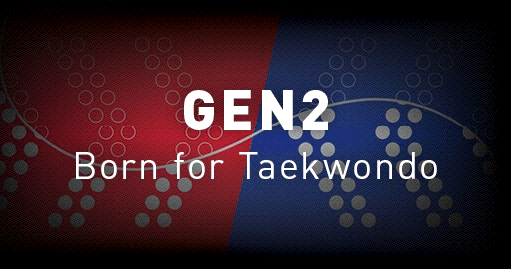 Among the coaches prowling the sidelines of taekwondo’s elite fields of play in 2015, one of the most notable was Karim Dighou.
Among the coaches prowling the sidelines of taekwondo’s elite fields of play in 2015, one of the most notable was Karim Dighou.
Why so? Because although Dighou does not have the benefit of representing a taekwondo powerhouse like Iran or Korea – he hails from little Belgium – that has not prevented his lads, Jaouad Achab and Si Mohammed Ketbi, from grabbing two quota places for the Rio Summer Games in 2016; he has also coached refugee Raheleh Asemani to the Olympics.
Now 45, the Morocco-born Dighou originally got interested in the way of fist and foot at 12, “…because I liked Bruce Lee!” As was the case for so many martial arts aficionados, his parents first enrolled him in taekwondo classes to keep him out of trouble. “I was always getting into fights in school and after making a lot of trouble for my parents, they decided to take me to a taekwondo club,” he recalled. “Then my behavior changed and I was a lot more controlled.”
Dighou still practices – but, he wryly admitted, with a bit more difficulty than in his younger years. “Everyday I teach the national team,” he said. “It is hard to practice with them, and I try to do some stuff, but it is not easy!”
His first experience of coaching was the result of a wipeout in a competition.
When he was 19, he and his classmates entered the Belgian Championships. “We all lost in the first round!” he recalled. “I went to my coach and said, ‘Something is wrong, we have to change our training,’ and he said, ‘If you know how to do it, do it – I can’t!’ I said, ‘OK. I will try.’
Dighou went to work, immersing himself in all the material he could find on training methods, techniques, tactics, conditioning and rules: “I researched everything I could get my hands on – video, travelling to other people, going to other schools, going to competitions. Before, I had not had the concept of kyorugi. After the research, it was all clear to me.”
Dighou instituted everything he was learning at his club on a trial-and-error basis. Results followed: The following year, his school produced five senior Belgian champions. He himself was a Belgian national champion and a captain of the Flemish team, but never quite became a European or world champion: “Maybe because there were other guys who were too talented,” he said – adding, in a nod to the problem that bedevils all sports, “And it was politically hard, too.”
Now an established professional employed by BLOSO, the Flemish government’s sports department, and by the Belgian Olympic Committee, he reels off the list of qualities required by the 21st century coach. “He or she has to be healthy, has to react at the right moment, say the right thing at the right moment and have a very good eye,” he said. “You have to see all body motions very well, you have to understand timing and you have to understand taekwondo.”
Off the competition floor, further attributes are required for team training and management. “The most important thing is psychology, to manage the group dynamic – keep them ’happy but hungry,’” he said. “And you have to know the players – everybody has their own character.”
Obviously, fairness is critical in coaching. “I cannot pick on someone, I don’t have favorites; all my team are my students,” Dighou said. So is toughness. “I am very good with my team, but I can be very hard too,” he added.
Asked to describe himself as a coach, Dighou dropped into self-critique mode. “Sometimes I react very much in the moment,” he mused. After thinking, he added some philosophical insight: “If my athlete loses and the other athlete is better, I don’t care as long as I benefit,” he said. “A loss without a lesson is a loss. A loss with a lesson is a win.”
In Belgium, the talent pool at Dighou’s disposal is limited. “We live in a small country, we do not have the pick of 10,000 athletes,” he said. “I have to do what I can with the people I have.” Given this limitation, three Rio quota places suggest Dighou has punched above his weight. “We are a small country but we have had some good results,” he said.
One benefit to being a small country is that it is easy to scour the land for future stars. “Our talent detection starts very early, we have to see if they have potential at a young age,” Dighou said. “If we see it and he or she wants it, we try to get them into the system.” Two taekwondo athletes are currently paid monthly stipends by the Belgian sport authorities.
The system includes sport-specific schools, but Dighou admits that with taekwondo being a low-profile sport, it is difficult to convince young people to take that step. “I try to encourage them and get them in, but it is not easy, they have to make hard decisions – like moving house, or going to live in a dormitory,” he said. “I am talking about children of 13 years.”
Raising the sport’s profile and winning more (and richer) corporate sponsorships is a major challenge for taekwondo in the future. “We have to be more professional in everything, and in planning for the year,” he said. “It is difficult to get sponsors if we do not have a clear plan, we need to have a manual to give to potential sponsors.”
Like every WTF athlete and official, Dighou has strong opinions on the state of the game.
“Taekwondo has changed a lot and sometime it changes too fast but it is getting better and better,” he said. “I would like to have one system so we can perfect it – now it is change all the time.” He praised the shorter rounds and reduced field of play which have made combats more intense. He also mentioned the evolving state of PSS electronics, but concedes that there are still bugs in the system. “Sometimes we have technical problems, but I know it took fencing 10 to 15 years to have a perfect system,” he said. “I think we can do better, but it takes time.”
With taekwondo techniques evolving alongside the PSS and the rule changes, there are inevitably issues. “Taekwondo is a very exciting sport,” he said. “We have a sport with great potential so we have to find the right formula to get what we deserve.”
While the WTF Grand Prix series has raised the bar for competition operation and athletic elitism, there is a downside to the rigorous schedule. “I don’t like airplanes – travel is very hard!” Dighou said. “It breaks the training rhythm, so we have to be very creative; to get the players in shape is not easy. Competition is now part of the training!”
Like everyone in top-rank taekwondo, Dighou is focused on Rio. In the upcoming months, he will be strategizing with his sports director, Laurence Rase, a former Athens Olympian and European champion, to come up with the perfect plan – training, competing and analyzing opposition. And the Olympics are the summit for any sports coach. “I am very happy to be part of this Olympic journey,” he said. “As this is the first time for me as a coach, it is a dream come true.”
Having delivered two Olympic taekwondo spots for Belgium, is he satisfied? Apparently not. “I am ambitious,” he said. ”
And that ambition extends beyond Rio de Janeiro.
“I hope to do one more Olympic cycle – may- be two,” he said. “For me, success is when you have the potential to do something and you do it: You get the maximum out of it.”
- TOKYO 2020
OLYMPICS - TOKYO 2020
PARALYMPICS - Competitions
- Qualification for Rio 2016
- World Taekwondo Championships
- World Taekwondo Grand-Prix
- World Para-Taekwondo Championships
- World Taekwondo Cadet Championships
- World Taekwondo Worldcup Team Championships
- World Taekwondo Junior Championships
- World Taekwondo Beach Championships
- World Taekwondo Poomsae Championships
- World Taekwondo Grand Slam
- Online 2020 World Taekwondo Poomsae Championships
- Olympic Games
- Paralympic Games
- Youth Olympic Games
- Continental Union Championships
- Summer Universiade
- 2019 Chungju World Martial Arts Masterships
- Multi Games
- Result History
- News
- Calendar
- Ranking
- ATHLETES
- Multimedia
- About WT
- Notice
- Rules
- Development
- Medical & Anti-Doping
- GALA
- Magazine
- PARA
- TOKYO 2020
OLYMPICS - TOKYO 2020
PARALYMPICS - Competitions
- Qualification for Rio 2016
- World Taekwondo Championships
- World Taekwondo Grand-Prix
- World Para-Taekwondo Championships
- World Taekwondo Cadet Championships
- World Taekwondo Worldcup Team Championships
- World Taekwondo Junior Championships
- World Taekwondo Beach Championships
- World Taekwondo Poomsae Championships
- World Taekwondo Grand Slam
- Online 2020 World Taekwondo Poomsae Championships
- Olympic Games
- Paralympic Games
- Youth Olympic Games
- Continental Union Championships
- Summer Universiade
- 2019 Chungju World Martial Arts Masterships
- Multi Games
- Result History
- News
- Calendar
- Ranking
- ATHLETES
- Multimedia
- About WT
- Notice
- Rules
- Development
- Medical & Anti-Doping
- GALA
- Magazine
- PARA
Copyright © 2015





















